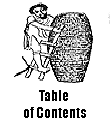
|
 To: Defar…yenE Defar From: AlemE I enjoyed the image of you as a 21st century arbeNa brandishing your sword as you wove around those groups: dismissing this one for an unconscionably low MUD-quotient, tapped the other on the shoulder for a job well done. En garde! Lunge, tap, parry, smack!...touché! But why'd you have choose Excalibur, Mandi jegnaw? It immediately derailed my own thinking...now I know the kind readers will condemn me for the sheer un-Ethiopian nature of my next reference, but how can I resist, given the Excalibur reference? Excuse me while I digress … Here's an excerpt from one of my favorite Holy Grail scenes…King Arthur meets two of his “subjects”, Woman and Dennis:
Mandeffie, are you paying attention? Here comes my favorite part...
Somehow, this little skit captures exactly what goes through my head anytime I think of our history. But enough said on that...and help me out of this pool, will you? I'm getting downright soggy. No fluffy, heated towels? Exactly what kind of a virtual mud-pit are you running here, anyway? Ah, never mind...on to other things... I recognize your evasive maneuvers regarding the tea as nothing other than a vain attempt to avoid serving it...demmo fruit sugar! Mnew wendm-alem?! All I wanted was a simple cup of tea! You can make it in a copper bottomed kettle, or one made of the purest, most stainless of steels, or a blistered enamel berad; even a saucepan would be fine as long as it is free of the overpowering smells of onions or garlic. Now throw in some good black tea from Addis Abeba and some good ol' Wenji sugar, add yeshaï Qurs biTE, and we're set. If you're of the high tea persuasion, you can bring a plate of cucumber sandwiches with the crusts cut off, and some currant scones with some clotted cream and some preserves (orange marmalade, I presume?). The point, anteyE, is to sit together and share a quiet, reflective moment. Ah...it doesn't seem like you're going for that kettle anytime soon, and all this talk has made me thirsty -- "hold" argeN isti while I go fix myself that cuppa. Ahhhh...that's much better! Oh...did you want some? ☺ Now for your MUD...an excellent analysis, bak'h. Unable to resist yet another of your temptations, here's my own addition. When cher'net and habt go hand-in-hand and Qeld and astewaynet follow, CHQA becomes the ideal state for the new Ethiopian -- and the implicit reference to the slime we started our conversation with in both your and my acronyms is a good way to show that we've come full circle (of course, it may also show that we haven't progressed at all since those first entries more than a month ago. But let me stay somewhat optimistic). I wanted to echo your brilliant categories (you had me nodding to myself and even laughing out loud) by throwing in a few of my own. I offer you these as a compromise, wendm'y'ye, since neither age nor social or economic class nor pedigree have anything to do with where people end up in these categories. Clever, aren't I? May I add an ambere CHQa category? These are the immature party-hard types who haven't yet figured out where play ends and life begins -- and some of them have seen 50 come and go, so it's not about age. Irresponsible, irrational, irritating molQaQoch, they haven't got an ounce of cher'net or astewaynet; thankfully, they rarely have the habt and sense of humor, either. So let's leave them to play with their li'l friends... The taTbo CHQa are all around us, in the US but especially back home. These are the ones who have actually learned some harsh lessons in their various s'det locales all over the world, and they were able to return home, relieved at not having to live those lives any more. Yet, three months into their renewed lives, you find they have morphed into the worst that Addis Abeba has to offer...F- on cher'net although they often do well on the habt scale; a pathetic D on the Qeld (lamer than lame sense of humor) and an F- on astewaynet. If they had an album, it would be called the De-Education of ine-int'nye. Finally, the TQur CHQA: productive, practical people whose fertile minds and rich imaginations go a mile-a-minute. Straight A's all around on the CHQa scale; add to that the fact that they have their feet firmly planted on the ground, and we may just have the winning "class" right here. Want to declare ourselves two of their charter members? It seems only fair...especially since this was a much harder topic than most that I've read about on Seleda. There are ilf possibilities for getting both political and too personal; the former would be a Seleda no-no, and the latter would do no good and possibly bring on much harm. Remind me to get even with the Seleda editor who suckered me into participating in this. [Qoy bcha!] My final view is that, like King Arthur and his alleged "subjects" in the Monty Python skit, no matter how society organizes itself around you, you have a big say in how you present yourself -- ultimately, that is much more powerful than any so-called objective categorization by politicians or economists. And like the mud we've been sloshing around in, this issue is as slimy and murky as we can get. So, although it's been great wallowing down here with you, I'm going back to my "climb your own tree" approach. Hey, I've been in your MUD, so how about you come with me this time -- why don't we both lift ourselves past this ooze? I'll go first (hey, no looking under my virtual towel!)... Ah, up here on my hybrid bougainvillea oak tree (hey, my tree, my call), it's safe and fragrant, and pleasing to the eye. There are lots of branches for those who want to join me, and some of those same branches overlap into other neighboring trees where I can visit -- freely going back and forth. There's even a vine for an express trip, Tarzana style (yemn Jane?!), to those branches beyond the reach of my tree. I don't care about the other trees' roots, or their occupants'...who has the time to keep track? If you came to visit, things like how many times you slammed into the tree before figuring out how to work the vine would be infinitely more important than the name of the designer who fashioned you that loin-cloth (and may I add as an aside that it is quite becoming?). I like that I can say what I want on my tree. Add that to the list. Once you leave your tree to go to another, you start over...no history, no baggage. You can be someone new if you like, or stick with what has worked in the past. Your choice. Have I been idealistic and naïve in my description? Have I oversimplified and reduced incredibly complicated situations and arguments to the size of a drop of water (no mud included)? Do I call on you for understanding and generosity of spirit? Yeah, Yeah, and Hell, Yeah! After all, nothing is impossible if a couple of people, a little muddier but perhaps a bit wiser, find some common ground. I made you a cup of coffee (I guess I should have noticed that it's what you prefer). I think you'll like the pan-dried QiTa -- it's my favorite. May all your future tea parties have coffee. With my warmest regards, AlemE ~ .. ~ ~ .. ~ ~ .. ~ ~ .. ~ ~ .. ~ To: Alemé From: Mandefro Alemewa, When confronted with the four-megabyte Python extract [Note to Seleda editors: you should ban insertions that unjustly bloat a diarist's page and a half entry], the jingle that sent shivers to my hamot kereTit's enfeebled outer lining was the chorus from Tilahun Gessesse's Alchalkum. But then, I remembered my name (Mandefro, in case you forgot) and leaped from my chair to execute a few Akaki Zerafs. Once my sense of self-eminence was restored (Itititititititit…Zeraf!) I re-read your response and understood that we have both been travelling in the same direction and on the same parallel hadid. But since the middle planks that linked, stabilized and familiarized one hadid to the other were missing throughout our exchanges, we careened to and fro in entries one, two and three. Your Monty Python excerpt made me realize the gap in our communication. First, I chuckled at your Pavlovian reaction against all things imperial. In my last entry, I had brandished Excalibur not as a weapon for domination or oppression but as a symbolic tool to help fulfill my destiny. I will clarify myself even further as the symbol itself can easily be misinterpreted, for after all, a sword is a weapon of singular destruction. Once young Arthur received the sword from the Lady of the Lake (do not feel excluded, Alemé, for the Lad of the Lagoon lies await on the sandbar with the weapon of your choice), he became confident and enthused to tackle what fate laid in store for him. After several difficult encounters he mastered the sword and became a proficient and efficient fencer. In the same way, I believe our generation has completed the trial runs and has learned to regulate (mind you, not to control) its self-destructive impulses. I do not then feel compelled that we should hand over the chalice to our younger siblings before we had taken our fill. Otherwise, we would be committing the same crime for which I had prosecuted 60 to 75 year olds in my last entry: early retirement. We both are interested in constructing, laying down and directing our own hadids. You, Rosie Yichalal, do not look back for inspiration, guidance or benediction. Not unlike the Huguenots or Quakers who fled from religious prosecution or central and southern Europeans (among others) who disentangled themselves from abject poverty to start anew in North America, you visualize a future where each individual can select, water, fertilize and prune his/her tree. Complete responsibility would then fall on the gardener for the condition of his/her tree. You opted for the bougainvillea oak hybrid tree. I, on the other hand, believe that we have run out of space and must stake our claim (or most probably reclaim) from the already overcrowded plots. In this environment, one must have a profound understanding of the past and a solid grasp of former power relations. Let me elaborate by recounting a story that I heard from an Indian friend. My friend's family lives in a communist Indian State. They own five acres of land that is bordered by streams on three sides and a road on the fourth. The land has remained intact in the family's possession for several generations. In former days, the land was located in a sleepy provincial town (much like Akaki or Bishoftu), adjacent to a bustling city. Population explosion has caused the city to encroach and gobble the Nifas Silk's and the Qaliti's and is now ready to do to the same to my friend's hometown. His parents worked as functionaries in New Delhi for most of their adult lives. Now, they wish to live in relative solitude and tranquility on their five-acre lot, waking up to the sounds of birds nesting on branches that dangle over their corrugated iron roofs. Developers—in spite of a large "Not for Sale" sign on the front gate—knock on their doors regularly asking them to name a price for their sanctuary. My friend's parents do not leave town for holidays for fear of squatters claiming some or all of their land. The communist courts frown upon "absentee" landlords and would assuredly rule in the squatters' favor. You and I have to navigate in a world where the right to own property and the right to have a roof over one's head are inextricably linked. Handing over the five-acre lot has not and will not be the solution. Clearly, rural land and urban property nationalization by the military junta or ethnic partitioning of the country by the present government did not and has not solved the food and housing shortage in our country. What is to be done? That, my dear Alemé is what our generation needs to figure out in order to address the widening rift between Bole and Tekle Haymanot, between Mekele and Ginir, between Limu and Debre Berhan. Of one thing I am certain. Solutions by proclamations, decrees and manifestos are over. We, accompanied by a few elderly sages, need to do some field work and talk to the owners of the five-acre lot, the developer, the conservationist, the squatter, and the judge. Why don't we get together for tea once we've done that? Mandefro |

|

|

|

|

|
| © Copyright SELEDA Ethiopia, April 2001. All Rights Reserved. |